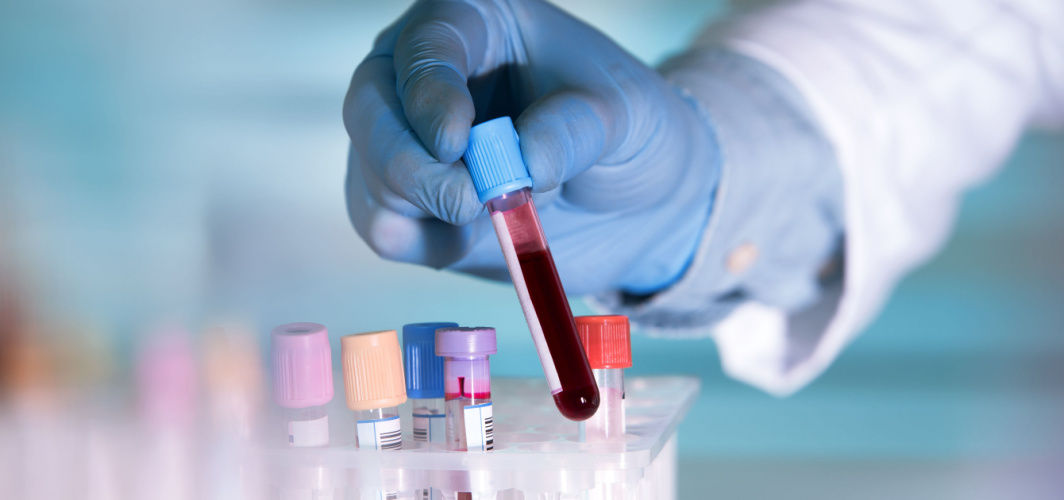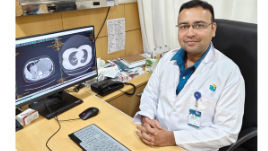General Health
The Role of MRI Scans in Detecting and Diagnosing Cancer
9 min read
By Apollo 24|7, Published on - 06 October 2023
Share this article
0
0 like

Cancer is a complex disease characterised by the abnormal growth and division of cells. It is a significant health concern in India, with the estimated number of incident cases of cancer in India for the year 2022 being found to be 14,61,427. One of the advanced imaging techniques used for cancer detection and diagnosis is the MRI scan. Magnetic Resonance Imaging (MRI) uses powerful magnets and radio waves to create detailed images of the body's internal structures. In this blog, we will delve into the powerful world of MRI scans for cancer detection and diagnosis, unveiling their potential to revolutionise early cancer detection and improve patient outcomes.
What is an MRI Scan?
MRI stands for Magnetic Resonance Imaging. It is a medical imaging technique that uses a powerful magnetic field, radio waves, and a computer to produce detailed images of the body's internal structures. Unlike X-rays or CT scans, MRI scans do not use ionising radiation, making them safer for patients.
Advantages of MRI Scans for Cancer Detection
MRI scans for cancer detection offer several advantages over other imaging modalities such as CT scans and X-rays.
- The first advantage lies in the superior soft tissue contrast provided by MRI scans. Unlike CT scans and X-rays, which primarily highlight bone structures, MRI scans can clearly distinguish between different types of soft tissues. This allows for better visualisation of tumours and their surrounding tissues, aiding in accurate diagnosis.
- Another significant advantage of MRI scans is their ability to detect small tumours and metastases. Due to their high resolution and sensitivity, MRI scans can identify tumours as small as a few millimetres in size. This early detection is crucial for effective treatment planning and improved patient outcomes.
- Furthermore, MRI for cancer detection are non-invasive and radiation-free imaging options. This makes them safer for patients, especially those who require frequent imaging or individuals who may be more susceptible to radiation-related risks.
MRI Scan Applications in Cancer Detection and Diagnosis
What is an MRI scan used to diagnose extends prominently to cancer detection and diagnosis. In this section, we will delve into a comprehensive exploration of MRI scans for cancer detection and diagnosis.
1. Breast Cancer
MRI scans play a crucial role in the detection and diagnosis of breast cancer. They complement other imaging modalities like mammography and ultrasound, providing valuable information that helps in accurate evaluation. Unlike mammography, which relies on X-rays, MRI uses powerful magnets and radio waves to create detailed images of the breast tissue.
- One of the key advantages of MRI scans is their ability to detect occult tumours, which may not be visible on mammograms or ultrasounds. This is especially important for women with dense breast tissue or those at high risk for developing breast cancer.
- MRI scans also help evaluate the extent of the tumour, allowing healthcare providers to plan appropriate treatment strategies.
- In addition to detection, MRI-guided biopsy is another valuable application. It allows doctors to precisely target suspicious areas seen on the MRI scan and obtain tissue samples for accurate diagnosis.
2. Prostate Cancer
MRI scans have proven to be incredibly useful in detecting and diagnosing prostate cancer. These scans allow doctors to visualise the prostate gland and identify any tumours present.
- By providing detailed images of the prostate, MRI scans help doctors precisely target suspicious areas, increasing the accuracy of biopsies.
- Additionally, multiparametric MRI scans for cancer can assess the aggressiveness of prostate tumours. By analysing various parameters, such as blood flow and cell density, doctors can determine if a tumour is more likely to be aggressive or indolent. This information plays a crucial role in treatment planning, allowing doctors to tailor treatments based on the tumour's aggressiveness.
- Moreover, MRI scans are also essential for treatment planning for prostate cancer. They assist in guiding targeted biopsies, which can lead to more accurate results and better treatment decisions.
- Furthermore, MRI scans are used in focal therapy, where only specific areas of the prostate with tumours are treated, minimising side effects and preserving overall prostate function.
3. Colorectal Cancer
Colorectal cancer is a common form of cancer that affects the colon or rectum. MRI scans play a crucial role in the preoperative staging of rectal cancer, helping healthcare professionals make informed decisions about treatment options.
- One key application of MRI scans in colorectal cancer is the evaluation of lymph node involvement and distant metastases. By analysing the images obtained from the MRI scan, doctors can determine if the cancer has spread to nearby lymph nodes or other parts of the body. This information is essential for accurate staging and treatment planning.
- Additionally, MRI scans are used to assess tumour response to neoadjuvant therapy. Neoadjuvant therapy, such as chemotherapy or radiation, is often given before surgery to shrink tumours and improve outcomes. Through MRI scans for cancer, doctors can monitor the tumour's response to neoadjuvant therapy, allowing for adjustments in treatment plans if necessary.
4. Brain Tumours
MRI scans play a crucial role in the detection and diagnosis of brain tumours.
- In addition to initial diagnosis, MRI scans are valuable in monitoring the progression or recurrence of brain tumours during follow-up imaging. These scans allow doctors to assess any changes in the tumour over time, helping them make informed decisions about the most appropriate course of action.
- Furthermore, MRI scans are instrumental in treatment planning for brain tumours. They provide surgeons with precise images that can be used for surgical navigation. By visualising the tumour's location and surrounding structures, surgeons can perform procedures with greater accuracy and minimise damage to healthy brain tissue.
Preparation and Procedure for an MRI Scan
In this section, we will delve into the preparation and procedure for an MRI Scan
1. Pre-scan Preparation
Before undergoing an MRI scan, certain preparations need to be taken into consideration. These preparations ensure the accuracy and effectiveness of the scan.
- Fasting Requirements: Depending on the type of MRI scan, fasting may be required. For example, if you are undergoing an abdominal MRI scan, you may be asked to fast for a specific period before the procedure. This is done to obtain clear images of the abdominal area without interference from food or drink.
- Medication and Metal Implants: It is crucial to inform your healthcare provider about any medications you are taking. Some medications may need to be temporarily stopped before the MRI scan. Additionally, metal implants such as pacemakers or joint replacements can interfere with the magnetic field used in the MRI machine.
2. Procedure of the MRI Scan
When it comes to cancer detection and diagnosis, an MRI scan plays a crucial role. Let's take a closer look at what you can expect during the procedure.
During the MRI scan, you will lie down on a table that slides into the MRI machine. It's essential to remain still and relaxed throughout the process to ensure accurate image acquisition. The machine may produce loud noises but don't worry, as you'll be provided with earplugs or headphones to minimise any discomfort.
The duration of the procedure varies depending on the body part being scanned, but it typically ranges from 30 minutes to an hour. For individuals who experience claustrophobia, there are options available such as open-sided MRI machines or sedation to help you stay calm and comfortable.
Interpreting MRI Scan Results
What is an MRI scan used to diagnose encompasses a wide range of medical conditions, and interpreting MRI scan results is a crucial step in translating the generated images into meaningful diagnostic information.
1. Role of Radiologists in Interpreting MRI Scans
When it comes to diagnosing cancer, an MRI scan plays a crucial role. However, it requires expertise and specialisation to accurately interpret the results. This is where radiologists come in.
Radiologists are medical doctors who specialise in diagnosing and treating diseases using medical imaging techniques like MRI scans. They have extensive knowledge of anatomy, physiology, and pathology, allowing them to identify abnormalities and potential cancerous lesions on the scans.
Collaboration with other healthcare professionals is also essential for accurate diagnosis. Radiologists work closely with oncologists and surgeons to discuss their findings, consult on treatment plans, and provide valuable insights into the extent and location of tumours or metastasis.
2. Common Findings on MRI Scans
When examining an MRI scan for cancer, radiologists look for specific features that indicate malignancy. If these characteristics are present, it suggests a higher likelihood of cancer. These features include:
- Irregular borders
- Heterogeneous enhancement
- Restricted diffusion
Moreover, MRI scans can also detect tumours spread to nearby structures or distant sites. This is crucial for determining the stage of cancer and developing an appropriate treatment plan. By identifying metastasis early, doctors can intervene promptly and improve patient outcomes.
Limitations and Future Developments
In this section, we will delve into the limitations of MRI for cancer detection and diagnosis, as well as explore potential future developments that may further enhance its capabilities in this critical area of healthcare.
1. Limitations of MRI Scans in Cancer Detection
While MRI scans are highly effective in diagnosing and detecting cancer, there are certain limitations to be aware of. One limitation is the potential for:
- False-positive Result: It occurs when the scan indicates the presence of cancer when there is none, leading to unnecessary worry and further testing.
- False-negative Result: It occurs when the scan fails to detect cancer that is present. This can delay diagnosis and treatment, potentially impacting patient outcomes.
Another challenge with MRI scans is differentiating between certain tumour types. Some tumours may appear similar on an MRI, making it difficult for radiologists to accurately determine the specific type of cancer. This can impact treatment planning and personalised care.
2. Emerging Advancements in MRI technology
One exciting advancement in MRI technology is the use of functional MRI (fMRI) techniques. Traditional MRI scans provide detailed anatomical images, but fMRI takes it a step further by assessing tumour blood flow and metabolic activity. This allows doctors to not only visualise the tumour but also evaluate its functionality and aggressiveness.
Another promising development is molecular imaging using targeted contrast agents. These agents specifically bind to cancer cells, making them more visible on the MRI for cancer detection. This enables more precise tumour characterisation, helping doctors make accurate diagnoses and tailor personalised treatment plans.
Conclusion
In conclusion, early cancer detection and accurate diagnosis are crucial for improving patient outcomes. MRI scans play a vital role in the diagnostic process by providing detailed images of the body's internal structures. MRI scans are used to detect and diagnose cancer in various parts of the body, such as the brain, breast, prostate, and bones. If you have any risk factors for cancer or are experiencing suspicious symptoms, it is important to consult with your healthcare provider. Remember, early detection increases the chances of successful treatment and improved outcomes. So don't hesitate to seek medical advice if you have any concerns about cancer.
General Health
Consult Top Oncologists
View AllFrequently Asked Questions
How long does an MRI scan for cancer detection take?
How long does an MRI scan for cancer detection take?
Are there any risks associated with getting an MRI scan?
Are there any risks associated with getting an MRI scan?
Is an MRI scan the only method used for cancer detection?
Is an MRI scan the only method used for cancer detection?
How is an MRI scan used for cancer detection?
How is an MRI scan used for cancer detection?
Is an MRI scan painful?
Is an MRI scan painful?
Leave Comment
Recommended for you

General Health
10 Benefits of Consuming Fish Oil Supplements
Discover the health benefits of fish oil supplements, the recommended dosage, and the latest safety guidelines. Improve your overall well-being with this essential omega-3 fatty acid supplement.
%20(1).jpg?tr=q-80)
General Health
Blue Tea Benefits: Learning About This Antioxidant-Rich Drink
Discover the amazing benefits of blue tea, packed with antioxidants that promote overall health. Learn how this vibrant drink can support your immune system, reduce stress, and more!

General Health
What is a Blood Culture Test and When Should You Take It?
Learn about the importance of the Blood Culture Test, when to consider it, and how it aids in diagnosing various infections and illnesses.
Subscribe
Sign up for our free Health Library Daily Newsletter
Get doctor-approved health tips, news, and more.
Visual Stories

Plant-based Foods That Are a Great Source of Iron
Tap to continue exploring
Recommended for you

General Health
10 Benefits of Consuming Fish Oil Supplements
Discover the health benefits of fish oil supplements, the recommended dosage, and the latest safety guidelines. Improve your overall well-being with this essential omega-3 fatty acid supplement.
%20(1).jpg?tr=q-80)
General Health
Blue Tea Benefits: Learning About This Antioxidant-Rich Drink
Discover the amazing benefits of blue tea, packed with antioxidants that promote overall health. Learn how this vibrant drink can support your immune system, reduce stress, and more!

General Health
What is a Blood Culture Test and When Should You Take It?
Learn about the importance of the Blood Culture Test, when to consider it, and how it aids in diagnosing various infections and illnesses.



